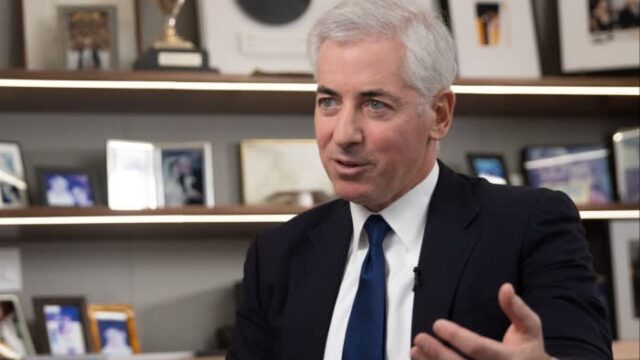Unlock the Editor’s Digest for free
Roula Khalaf, Editor of the FT, selects her favourite stories in this weekly newsletter.
The writer is a former financials research analyst at Credit Suisse and head of corporate strategy at Nex Group
Billionaire Bill Ackman’s plan to take his firm Pershing Square public next year is a rare move of its kind in the hedge fund world.
Big hedge funds mostly prefer to do their work under private ownership away from the hoopla of public markets. When they have listed, the limited record is not very pretty. The most notable car crash is Sculptor, the hedge fund group formerly known as Och-Ziff Capital Management. Valued at $12bn when it listed in 2007 before the financial crisis, it was bought for $720mn last year by Rithm Capital.
Given how active hedge funds are in public markets, their lack of listings might seem odd — particularly in light of the strong record of broader private capital firms such as Blackstone, Apollo and KKR.
The big listed private market investment firms have seen their values surge, overtaking those of many traditional asset managers. The aggregate market capitalisations of the 10 largest listed players is around $550bn. Why then have so few hedge fund groups followed the same path to a listing? Well, it is partly a matter of different incentives at play.
When I covered the new sector of listed private equity and hedge fund businesses before the financial crisis, a perennial question was: could “alpha” scale? That is, whether the ability of an investment manager to deliver above-market returns is eroded as they manage more and more assets. It turns out scaling up has been difficult for some pure-play hedge funds. Many have chosen either to limit inflows to focus on performance. In other cases, growth has led to the degradation of returns, followed by outflows.
Given that investors value stable management fees more than volatile performance fees, that makes pure-play hedge funds less suitable for public markets than the private capital firms that have become asset-gathering monsters. The three most storied private capital firms — Blackstone, KKR and Apollo — today have assets under management of more than $2.3tn, an almost twelvefold increase since the financial crisis.
Overall, private market assets under management have increased from $4tn to $14.5tn in the past decade, according to Bain & Co. That compares with a rise from $2.4tn to $4.3tn for hedge fund industry assets, as estimated by data provider HFR
The leading private market investors have been adept at expanding into areas such as private credit. real estate and infrastructure. Only 30 per cent of Blackstone’s assets under management comes from private equity today. Apollo was an early investor in insurance with its Athene venture, which has powered recent growth.
There have been examples of large hedge funds successfully expanding outside their area of traditional expertise. One instance is Citadel’s growth in commodities. But hedge funds in general have some disadvantages as asset gatherers as they scale up. For private capital firms, the longer-term nature of their investments means the impact of performance is only felt with a significant lag on fundraising. And existing assets under management are sticky given the long duration of lock-ins for investors.
Key man risk is also not the same. There is much more day-to-day involvement of founders and the top layer of management in investment decisions in hedge funds. Citadel’s Ken Griffin and Point72’s Steve Cohen have a reputation for calling their portfolio managers at all hours of the day to query positions. And the long-term nature of private market funds tends to bind star managers to existing firms.
That all sets up Ackman’s move to list Pershing Square as a big test for the hedge fund world and whether listed firms can scale. Pershing already manages an investment fund with about $15bn of assets under management that trades on the London Stock Exchange and Euronext Amsterdam. As the Financial Times has reported, the fund generated about $155mn in management fees for the hedge fund in 2023 and a performance fee of $312mn. Ackman this week sold a 10 per cent stake in Pershing in a deal that values the hedge fund at just over $10bn.
By the time of its planned IPO, Pershing might have launched another permanent capital fund in the US, generating more fee income. This will make it look more like a listed private equity firm than a hedge fund in terms of locked-in capital. And Ackman’s high profile will draw the attention of potential investors. But the firm will have to demonstrate its acumen extends beyond him and it will still have less diversification than hedge funds like Citadel. A lot will still be riding on the persistency of investment performance.
.




